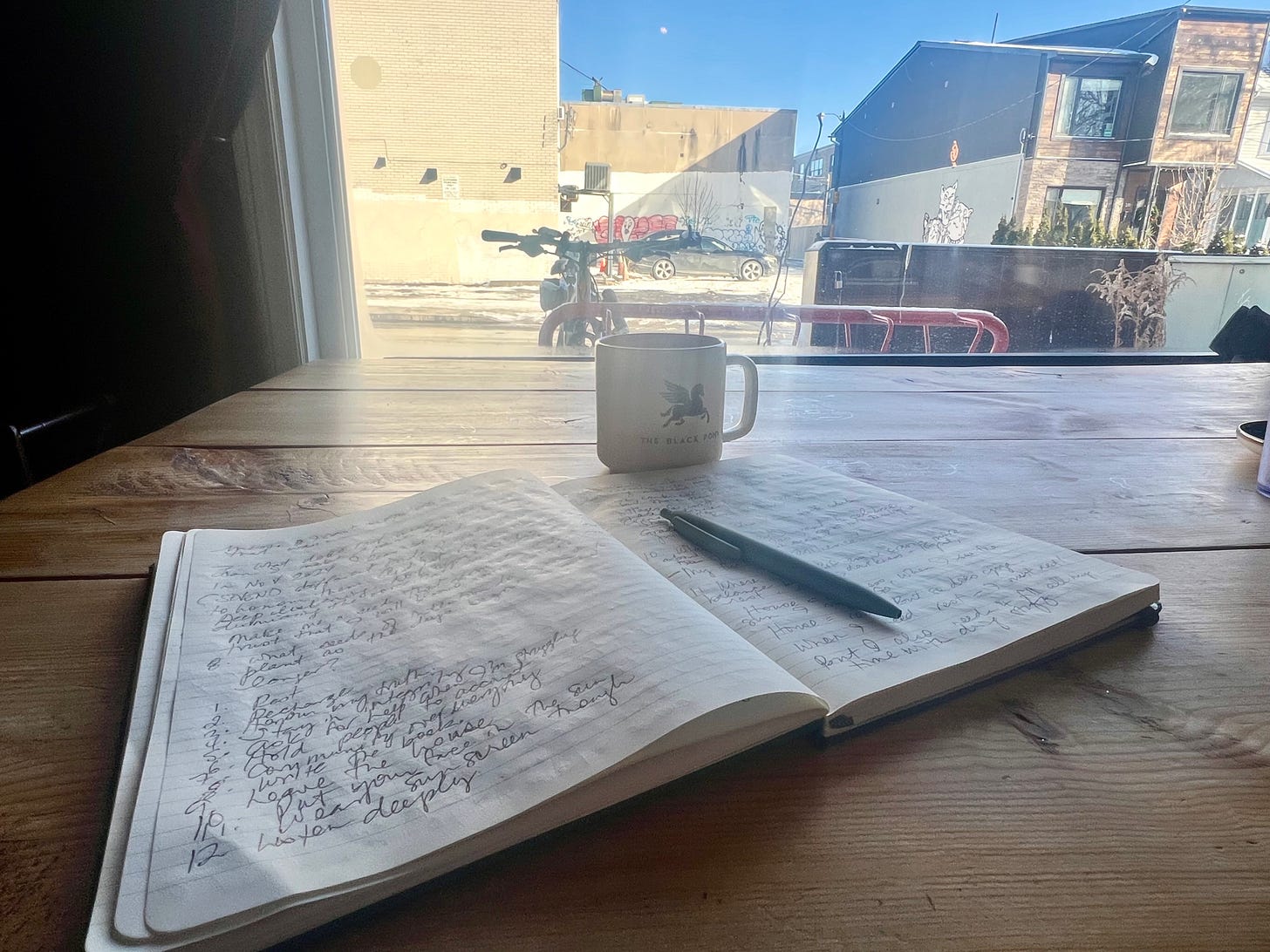How to Use ChatGPT as Your Personal Coach for Mental Health Support
My guide to free alternatives for accessible self-help including prompts
Content note: This post is about how you can use AI to help yourself over the holidays. But a reminder that this isn’t a replacement for actual professional help, just a bridge for when people who are trained to help are not available to you.
If you’re in Canada and need emergency support, please visit the government page that lists provincial and territorial support lines.
Remember, you matter. And mental health = HEALTH. PERIOD.
Edited to add: My friend Ronit who hosts
has a great point about AI data privacy in the comments. Do your research before proceeding & decide what you’re ok with sharing with robot overlords and the billionaires who run them before proceeding.What if your overthinking brain had a 24/7 friend who never rolled their eyes at your spirals and always had something helpful to say? Spoiler: You might already have one.
Life has a funny way of serving up its biggest challenges right when your resources are running low. This year, I found myself in that delightful space of deep personal crisis that many of us hit in midlife — you know, the kind where you like awake questioning every life decision you’ve ever made?
With my employment-provided therapy benefits maxed out and sessions running $150-$225 a pop, I needed another way to untangle my thoughts. My friends? They're amazing. But they've got their own shit going on, and there's only so many times you can text, "WHAT THE FORK AM I DOING WITH MY LIFE" before they start leaving you on read. (Love you all! Thanks for not blocking my number!)
Plus, some of what I was processing felt too raw and too personal to dump on others. You know that feeling when you need to work through something but you're not quite ready to speak it into existence with other humans? (Though, I hit a point Friday night at 2 am where I realized how much that has to do with internalized ableism and shame — a post for another time.)
Enter my unexpected ally: ChatGPT. Think of it like having a very patient friend who asks thoughtful questions and never judges you for eating cake for breakfast. Yes, it feels weird to pour your heart out to what's essentially a sophisticated calculator. But if you use the app, you can actually choose a voice that feels comforting to you and train it to speak to you in a way that works for you. I basically just lie there, and we chat back and forth. (Thanks, Sol — that’s my bot voice’s name.)

So, grab a beverage of choice, get cozy, and let me share how I turned AI into my personal growth buddy during one of the messiest chapters of my life.
Nadine’s AI Self-Coaching Framework
(because even rebels need structure)
Sometimes, we need a space to process our thoughts without judgment, especially during these holiday months when everyone else seems to be living their best Hallmark movie life while we're just trying to remember if we paid our phone bill.
This isn't about replacing human connection or coaching/therapy (seriously, talking to a pro is THE BEST when you can access it). It's about adding another tool to your emotional wellness toolbox — one that's accessible and available 24/7 and won't get compassion fatigue when you need to explore the same thought spiral for the hundredth time.
Whether you're navigating a crisis, feeling the pressure of the end of a year, or just need a safe space to process your thoughts, here’s a framework for using AI to get unstuck that might help.
1. Set Your Intention (AKA get clear on your mess)
Before you dive in, take a breath and get real about what you're trying to figure out. Are you processing a breakup? Questioning your career? Trying to understand why you keep choosing partners who are emotionally unavailable? (Just me? Cool, cool, cool.)
Try these prompts:
"Help me untangle why I'm feeling so blah about my job lately"
"I need to process this breakup without texting them at 2 AM"
"Guide me through why I keep procrastinating on [that thing you're avoiding]"
"I feel stuck in old patterns and need help seeing them clearly"
2. Get Real About Your Feelings (no filter needed)
This is where you word-vomit all those feelings you've been stuffing down with wine and Netflix. No need to be polite or organized—just let it all out. As someone who processes everything through writing, I find this part particularly cathartic.
Sample prompts:
"I'm feeling completely overwhelmed because..."
"Everything feels like too much, and I don't even know where to start"
"Can you help me make sense of this emotional tornado?"
"I'm angry/sad/confused, and I need to explore why"
3. Dig Deeper (without getting lost in the rabbit hole)
Fellow overthinking brains, I see you about to hyperfocus on analyzing every interaction you've had since Grade Three. Let's keep it focused. Think of AI as that friend who keeps you on track while still letting you explore what's really going on under the surface.
Try these:
"What patterns might be showing up here?"
"Am I being too hard on myself again?"
"Help me understand why this triggered me so much"
"What am I actually afraid of in this situation?"
4. Flip the Script (with self-compassion)
This is where we transform those "I'm a hot mess" thoughts into "I'm actually pretty amazing, even when I'm messy" realizations. And trust me, as someone who spent decades in the self-judgment trenches, this part is game-changing.
Sample prompts:
"How can I look at this situation with more self-compassion?"
"What would my future badass self say about this?"
"Help me find the growth opportunity here"
"What would I tell my best friend if they were in this situation?"
5. Make a Plan (that won't overwhelm you)
Because insight without action is just journaling (which is great, but sometimes we need more). The key here is baby steps—no massive life overhauls required.
Try these:
"What's one tiny step I can take today?"
"Help me break this down into non-overwhelming chunks"
"How do I turn these insights into actual change?"
"What's the smallest possible action that would feel like progress?"
Important Reality Checks
This IS NOT therapy: While AI can be a helpful tool, it's not a replacement for professional help. If you're really struggling, please reach out to a mental health professional. Your life matters, and sometimes we need human expertise to guide us through the rough patches.
Stay human: Don't use AI as your only source of support. We still need real human connection, hugs, and someone to split nachos with while ugly-crying. Trust me on this one.
Trust your gut: If something feels off about the AI's response, it probably is. You're still the expert on your life, even when it doesn't feel like it.
When to Use ChatGPTherapy*
(*name intended to be tongue-in-cheek)
Ideal for:
Late-night overthinking sessions
Processing minor setbacks
Brainstorming solutions to everyday challenges
Practicing self-reflection
Building self-awareness
Those moments when you need perspective but therapy is days away
Practicing challenging conversations: “Act as [PERSON IN YOUR LIFE] and help me rehearse this necessary but difficult conversation to help them understand why what they said upset me.”
Not great for:
True mental health crises (again - hotlines can be found here)
Major life decisions (AKA should I divorce the father of my children)
Complex trauma
When you really need a human hug
Times when you're feeling unsafe/might harm yourself or others. (I repeat - hotlines can be found here)
A Final Note on Using AI for Mental Health Support
The point isn’t to replace human connection with AI—you're adding another tool to your emotional wellness toolbox. Think of it like having a very patient, always-available friend who's really good at asking thoughtful questions and won't judge you for eating cake for breakfast or sobbing relentlessly in the middle of the night.
The goal isn't to become dependent on AI for emotional support but to use it as a stepping stone toward better self-understanding and growth. And hey, if it helps you stop drunk-texting your ex, that's a win in my book!
Want to go deeper? I've created two resources to support your inner work:
The Complete AI Self-Coaching Prompt Collection: A Google Doc with detailed prompts for everything from anxiety spirals to boundary setting. Save it for those moments when you need a judgment-free space to process your thoughts.
Witchy Winter Reflection Questions: While we've passed the solstice, we're still in the darkest days of winter — perfect for reflecting on the year that was and what we’d like to invite into our lives with a new year. These journal prompts will help you honour both the darkness and light within while visioning what's next.

Remember: You're doing great, even when it doesn't feel that way. Sometimes we just need help seeing our truth—even if it feels like you’re Joaquin Phoenix in the movie Her (no, they don’t have a ScarJo voice yet). 💕
What I'm Into Right Now
(For those who made it all the way down here - hi! 👋)
App: ChaniApp — I’ve been using this for daily meditation and astrological insights since it launched a few years ago. I’m obsessed with Canadian astrologer and activist, Chani Nicholas. Her voice is soothing AF, and unlike other meditation apps, she doesn't make me feel bad about my monkey mind. Plus, you get so much value, including weekly affirmations, astro forecasts, journal prompts and a weekly podcast customized to your chart! Here’s a purchase you won’t regret.
TV: Shrinking — I finally watched S3, and wow, as someone who's studied trauma, this show gets it. Plus, Harrison Ford doing therapy? Yes, please. (Why is he STILL so hot?) It’s the perfect mix of heart and humour, AND you get a special guest appearance from Roy Kent/Brett Goldstein/Daddy (sans beard).
Book: But What Will People Say? by Sahaj Kaur Kohli — A Harvard Public Health Best Book that's revolutionizing how we think about mental health through a cultural lens. I’ve likely recommended this before, but my second listen right before the holidays was quite validating.
From the brilliant mind who brought us the popular IG account, @browngirltherapy Kohli explores what it means to prioritize well-being while honouring family, community, and cultural identity. As someone navigating similar waters, this book feels like finding a map I didn't know I needed.
Bonus: She challenges traditional Eurocentric therapy models while offering practical tools for setting boundaries and processing generational stuff. Perfect for anyone trying to find their way between cultures while taking care of their mental health. Plus, her community here on Substack,
is a gift for those struggling with hybrid identities, as well as a model for those of us trying to facilitate important conversations in a container for healing and building a better world.This is my last post for 2024. Wishing you all endless jammie time with people you care about and lots of your fave snacks. Want to stay in touch?
Follow me on Instagram for doses of realness and inspiration
Read my essay in Back Where I Came From about culture, identity, and home
Visit my website [coming soon!] for workshops and resources







Using AI as a companion or therapist is a minefield of ethical dilemmas and as yet unknown unintended consequences. However, Nadine is approaching this in her own way, being openminded, honest and vulnerable, and sharing that with her audience. As we delve more into a human-machine hybrid world (and yes, I said “delve”) it’s now more important than ever that we connect with each other on a human level, even if that means sharing your personal experience connecting with a machine. Thank you Nadine!